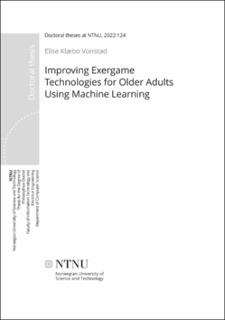Improving Exergame Technologies for Older Adults Using Machine Learning
Doctoral thesis
Permanent lenke
https://hdl.handle.net/11250/2992438Utgivelsesdato
2022Metadata
Vis full innførselSamlinger
Sammendrag
Facilitating exercise for the aging population is an important focus area in the years to come. Exercise is one of the keys to healthy aging, and the most effective measure for preventing disease and loss of independence. Technology is already an important tool in healthy aging, and in recent years exercise games (exergames) have been shown to be a motivating, fun and efficient method of exercising. However, the existing technologies that facilitate use of exergames have some drawbacks that could decrease usability and accessibility of exergames for older adults. Advances in artificial intelligence have provided tools and methods that might be useful for improving exergame technologies, but it is not known how well these work in the context of balance exergames. The overall aim of this thesis is to explore how use of machine learning can improve existing solutions of core elements of exergaming systems used for balance training in elderly.
Three research papers have been published as a result of the work in this thesis. These address three core aspects of exergame technologies: motion capture technology, movement pattern assessment, and force estimation. These papers together provide the following key findings:
• A deep learning image analysis system is a viable option for accurately extracting joint center locations from digital video for use in in-home exergame settings.
• A machine learning model can classify correctly performed medio-lateral weight-shifts in >9 out of 10 repetitions, without using pre-determined rules or thresholds.
• Weight-shifting performance can be reliably estimated from joint center kinematic data using a recurrent neural network.
In conclusion, we show that using machine learning models can make exergames more available and easy to use by eliminating possible barriers of use related to technological tools.
Består av
Paper 1: Vonstad, Elise Klæbo; Su, Xiaomeng; Vereijken, Beatrix; Bach, Kerstin; Nilsen, Jan Harald. Comparison of a Deep Learning-Based Pose Estimation System to Marker-Based and Kinect Systems in Exergaming for Balance Training. Sensors 2020 ;Volum 20.(23) https://doi.org/10.3390/s20236940 This is an open access article distributed under the Creative Commons Attribution License (CC BY 4.0)Paper 2: Vonstad, Elise Klæbo; Vereijken, Beatrix; Bach, Kerstin; Su, Xiaomeng; Nilsen, Jan Harald. Assessment of Machine Learning Models for Classification of Movement Patterns During a Weight-Shifting Exergame. IEEE Transactions on Human-Machine Systems 2021 ;Volum 51.(3) s. 242-252 https://doi.org/10.1109/THMS.2021.3059716 This work is licensed under a Creative Commons Attribution-NonCommercial-NoDerivatives 4.0 License (CC BY-NC-ND 4.0)
Paper 3: Vonstad, E.K., Bach, K., Vereijken, B. et al. Estimation of Ground Reaction Force from Kinematic Data in Balance Exergaming. the final published version is available in: Journal of NeuroEngineering Rehabilitation 19, 18 (2022). https://doi.org/10.1186/s12984-022-00998-5 Performance of machine learning models in estimation of ground reaction forces during balance exergaming. This article is licensed under a Creative Commons Attribution 4.0 International License (CC BY 4.0)
